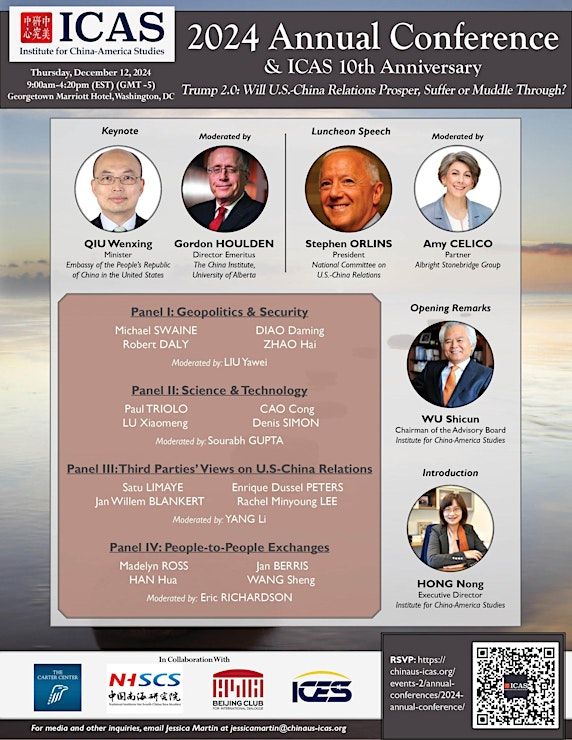Trump 2.0: Will U.S.-China Relations Prosper, Suffer or Muddle Through?
Schedule
Thu Dec 12 2024 at 09:00 am to 04:30 pm
Location
Washington Marriott Georgetown | Washington, DC

About this Event
About the 2024 Annual Conference
On January 20, 2025, the United States of America’s 45th president will also become its 47th president. As its 45th president, Donald Trump had declared China to be a revisionist power that was engaged in long term strategic competition with the United States in his administration’s National Security Strategy of December 2017. Over the next three years, he imposed hard-hitting Section 301 tariffs on China, technology denials and sanctions on firms ranging from Huawei to TikTok, and launched a controversial ‘China Initiative’ to root out perceived economic espionage and intellectual property theft by Beijing. Political, economic and people-to-people ties suffered during this period of disruption, and which was turbocharged following the spread of the COVID-19 virus to America’s shores in March 2020. All along during his time in office though, Mr. Trump maintained a cordial relationship with President Xi Jinping. With his dealmaking instincts and unconventional diplomatic style, a ‘Phase One’ trade agreement was signed with Beijing and a leader-to-leader channel of peacemaking opened on the Korean Peninsula.
As he returns to the Oval Office as America’s 47th president, Donald Trump has threatened to impose even higher tariffs on China. His disruptive approach to politics and policy, furthermore, threaten to destabilize the Biden-Xi consensus that was forged at the Bali G20 Summit in November 2022 and consolidated a year later at the Leaders Meeting in Woodside, California. Will the ‘San Francisco Vision’ that Biden and Xi forged be relegated now to the dustbin of history? Can the two sides candidly coexist over the next four years and embed their ‘new normal’ era of strategic competition within a durable strategic framework? Or is intense bilateral strategic rivalry inevitable? Will the decoupling in trade and technology ties become irreversible? Or is there an opportunity for Chinese inbound investment to stimulate the creation of good manufacturing jobs in Trump’s Middle America in the industries of the future, such as electric vehicles and battery storage systems? Can the two sides continue to manage their differences over the South China Sea and the Korean Peninsula as well as the interpretive gap between their respective One China Policy and One China Principle? Or will Taiwan become the critical node in the U.S.’ major power rivalry with — and containment of — China? How have the U.S.’ allies, partners, neutrals and adversaries in the Indo-Pacific region reacted to Trump’s return to the White House? What are their choices, expectations and anxieties? And will people-to-people ties — scientific, academic, cultural and recreational — serve as a ballast to the bilateral relationship? Or will racially coded attacks and mutual suspicion accentuate polarization between these two great countries and societies?

Where is it happening?
Washington Marriott Georgetown, 1221 22nd Street Northwest, Washington, United StatesEvent Location & Nearby Stays:
USD 0.00
